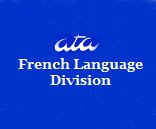 |
| Ann Wiles |
An interview by contributor Karen Tkaczyk.
For those readers who don't know you, can you tell us a little about your personal and educational background?
How or why did you get started in T&I?
The United Nations was a favorite destination for school trips when I was growing up. The buildings were impressive, but I was the most fascinated by the simultaneous interpreters. I never wanted to be an interpreter and didn't discover until many, many years later that there was such a thing as a translator. I found out through my umpteenth version of "What Color is Your Parachute?" and a particularly good career skills test that led me to the codes in the U.S. government's "Dictionary of Occupational Titles" that best suited me. One of those occupations was translator, and I knew immediately that I had found my career.
Do you have a good early story about your business?
Do you have a typical customer?
For those readers who don't know you, can you tell us a little about your personal and educational background?
How or why did you get started in T&I?
The United Nations was a favorite destination for school trips when I was growing up. The buildings were impressive, but I was the most fascinated by the simultaneous interpreters. I never wanted to be an interpreter and didn't discover until many, many years later that there was such a thing as a translator. I found out through my umpteenth version of "What Color is Your Parachute?" and a particularly good career skills test that led me to the codes in the U.S. government's "Dictionary of Occupational Titles" that best suited me. One of those occupations was translator, and I knew immediately that I had found my career.
Do you have a good early story about your business?
Do you have a typical customer?
• I have real-life, professional (non-translation) experience related to most of the translations that I take, from operative reports to human resource management to standard operating procedures to deciphering physician handwriting. My clients sense the difference in my translations, which stems from the fact that I have personally worked in an operating room, managed people in a large corporation, and written procedures in a business environment.
• I track quantitative indicators for my translation business. The greatest benefit is knowing ahead of time how long a project will take, since I have a strong aversion to staying up all night working on a translation (or anything else). Although I generally charge by the word, I track how much I make per hour, which assists me in determining, for example, if a certain payment "discount" makes sense. Surprisingly, it often does.
• I get much of my continuing education alongside physicians through the University of Michigan Medical School and receive credits approved by the American Medical Association.
Yes, but it's not printable. I have a good one, though, about searching for terminology. Medical records are notorious for their abbreviations and symbols. I can usually figure out symbols from the context, but nursing notes from France have arrows (some up, some down, some on the diagonal, etc.) that I couldn't figure out even after one 200-page job. I keep a list with me when I travel in case I find someone who can help. I came down with a minor illness that nevertheless needed immediate treatment while I was on what happened to be a French cruise ship in the Antarctic. The doctor was ashore visiting the penguins (I had already had my turn), so I struck up a conversation with the French nurse while waiting for him to get back. She had the answer to my question and was thrilled to be having a conversation in French. It turns out that no matter what direction the arrows are pointing, it always means the same thing, and it is true across hospitals in France. It refers to stopping or removing something such as a catheter, an IV, oxygen, etc. According to her, there is no symbol at all for starting a treatment. No wonder I was confused.
• Dealing with too much work.
• Dealing with not enough work.





No comments:
Post a Comment